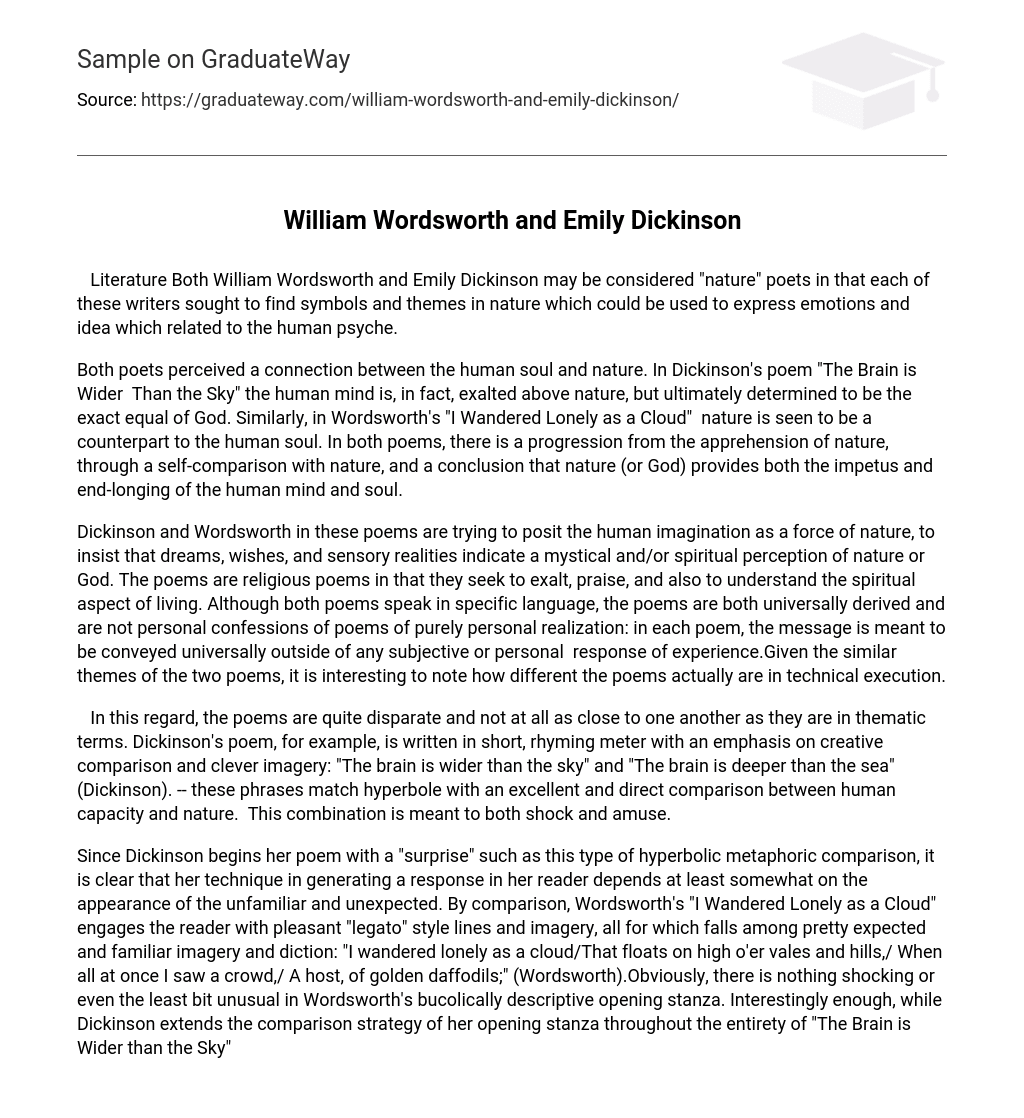Creation William Wordsworth and Emily Dickinson may be considered “nature” poets in that each of these writers sought to find symbols and themes in nature which could be used to express emotions and idea which related to the human psyche.
Both poets perceived a connection between the human soul and nature. In Dickinson’s poem “The Brain is Wider Than the Sky” the human mind is, in fact, exalted above nature, but ultimately determined to be the exact equal of God. Similarly, in Wordsworth’s “I Wandered Lonely as a Cloud” nature is seen to be a counterpart to the human soul. In both poems, there is a progression from the apprehension of nature, through a self-comparison with nature, and a conclusion that nature (or God) provides both the impetus and end-longing of the human mind and soul.
Dickinson and Wordsworth in these poems are trying to posit the human imagination as a force of nature, to insist that dreams, wishes, and sensory realities indicate a mystical and/or spiritual perception of nature or God. The poems are religious poems in that they seek to exalt, praise, and also to understand the spiritual aspect of living. Although both poems speak in specific language, the poems are both universally derived and are not personal confessions of poems of purely personal realization: in each poem, the message is meant to be conveyed universally outside of any subjective or personal response of experience.Given the similar themes of the two poems, it is interesting to note how different the poems actually are in technical execution.
In this regard, the poems are quite disparate and not at all as close to one another as they are in thematic terms. Dickinson’s poem, for example, is written in short, rhyming meter with an emphasis on creative comparison and clever imagery: “The brain is wider than the sky” and “The brain is deeper than the sea” (Dickinson). — these phrases match hyperbole with an excellent and direct comparison between human capacity and nature. This combination is meant to both shock and amuse.
Since Dickinson begins her poem with a “surprise” such as this type of hyperbolic metaphoric comparison, it is clear that her technique in generating a response in her reader depends at least somewhat on the appearance of the unfamiliar and unexpected. By comparison, Wordsworth’s “I Wandered Lonely as a Cloud” engages the reader with pleasant “legato” style lines and imagery, all for which falls among pretty expected and familiar imagery and diction: “I wandered lonely as a cloud/That floats on high o’er vales and hills,/ When all at once I saw a crowd,/ A host, of golden daffodils;” (Wordsworth).
Obviously, there is nothing shocking or even the least bit unusual in Wordsworth’s bucolically descriptive opening stanza. Interestingly enough, while Dickinson extends the comparison strategy of her opening stanza throughout the entirety of “The Brain is Wider than the Sky” while simultaneously increasing the hyperbolic inferences until she has matched God and man as equals, Wordsworth slowly extends and deepens the associations and images of his poem.
The imagery flows from a simple, easily imagined scene as described in the first stanza to a more complete and captivating description of nature’s beauty: “Continuous as the stars that shine/And twinkle on the milky way,/They stretched in never-ending line/ Along the margin of a bay:/Ten thousand saw I at a glance,/Tossing their heads in sprightly dance.” (Wordworth). The implication of nature’s grandiosity and the human observer as an aspect of this grandeur is as clear in Wordsworth’s poem as it is in Dickinson’s; however, the technique and style of expressing this “one-with-God-and-Nature” theme is entirely different. Dickinson relies on comparison, hyperbole, and a direct invocation of diety while Wordsworth develops his theme over a much more subtle, slowly expanding realization.
Both poets took their “cue” from nature and both poets seek to exalt the human experience in nature as a spiritual revelation. That the poets could have each expressed such indelible verses on essentially similar themes with disparate techniques only lends credence to the universality of nature implied in both poems.
Discuss how Emily Dickiinson and Wiliam Wordsworth go about saying similar things in two very dfferent ways in their poems `The Brain is wider than the Sky` – (by Dickinson) and `I wandered Lonley As a Cloud` – (by Wordsworth). Be shure to explain what each poem is about and what they are trying to say BEFORE explaining how they go about to say.





